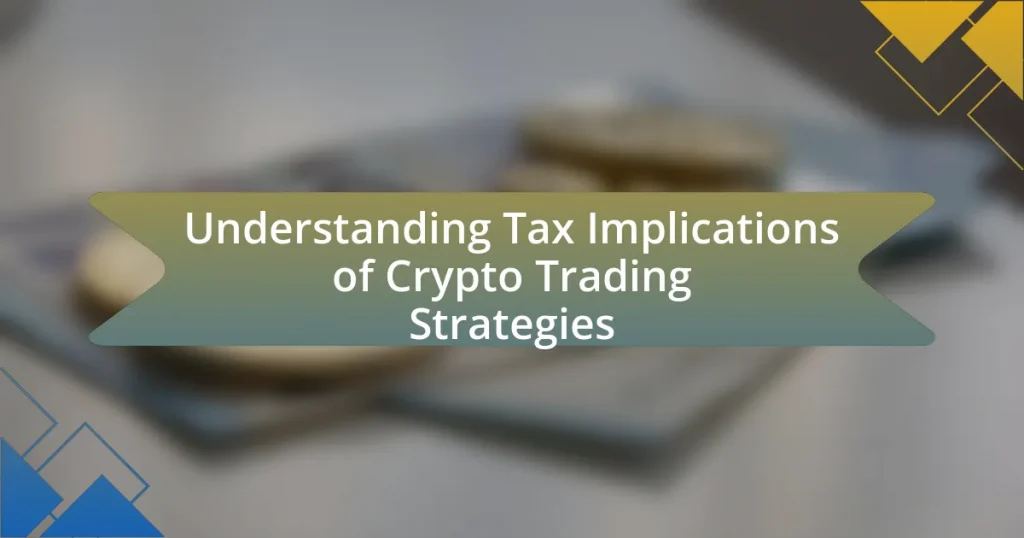The General Data Protection Regulation (GDPR) is a critical data protection law in the European Union that significantly impacts crypto trading operations. It mandates that companies handling personal data of EU citizens ensure transparency, obtain explicit consent, and implement robust security measures. Key principles of GDPR, such as data minimization and user rights, directly influence how crypto exchanges collect, process, and store personal data. Non-compliance with GDPR can lead to substantial fines and reputational damage, making adherence essential for crypto trading platforms. The article explores the implications of GDPR for data processing in crypto exchanges, the challenges faced in achieving compliance, and best practices for enhancing data protection and user trust.

What is GDPR and How Does it Relate to Crypto Trading Operations?
GDPR, or the General Data Protection Regulation, is a comprehensive data protection law in the European Union that governs how personal data is collected, processed, and stored. In the context of crypto trading operations, GDPR mandates that companies handling personal data of EU citizens must ensure transparency, obtain explicit consent, and implement robust security measures to protect that data. For instance, crypto exchanges must inform users about how their data will be used and provide them with rights to access, rectify, or delete their information. Non-compliance with GDPR can result in significant fines, up to 4% of a company’s global annual revenue, emphasizing the importance of adherence for crypto trading platforms operating within or targeting the EU market.
What are the key principles of GDPR?
The key principles of GDPR are lawfulness, fairness, and transparency; purpose limitation; data minimization; accuracy; storage limitation; integrity and confidentiality; and accountability. These principles ensure that personal data is processed legally, collected for specified purposes, limited to what is necessary, kept accurate, retained only as long as needed, secured against unauthorized access, and that organizations are responsible for compliance. Each principle is designed to protect individuals’ privacy rights and enhance their control over personal data, aligning with the regulation’s overarching goal of safeguarding personal information in the digital age.
How do these principles apply to personal data in crypto trading?
The principles of GDPR apply to personal data in crypto trading by ensuring that data is processed lawfully, transparently, and for specified purposes. Crypto trading platforms must obtain explicit consent from users before collecting their personal data, which includes identification details and transaction history. Furthermore, these platforms are required to implement data protection measures, such as encryption and access controls, to safeguard user information. For instance, a study by the European Data Protection Board highlights that non-compliance with GDPR can lead to fines up to 4% of annual global turnover, emphasizing the importance of adhering to these principles in the crypto trading sector.
What are the implications of GDPR for data processing in crypto exchanges?
GDPR imposes strict regulations on data processing in crypto exchanges, requiring them to ensure transparency, obtain explicit consent from users, and implement robust data protection measures. Crypto exchanges must inform users about how their personal data will be used, stored, and shared, which aligns with GDPR’s principles of accountability and transparency. Additionally, exchanges are obligated to facilitate users’ rights, such as the right to access, rectify, or erase their data, and must report data breaches within 72 hours. Non-compliance can result in significant fines, up to 4% of annual global turnover or €20 million, whichever is higher, emphasizing the importance of adhering to GDPR standards in the crypto sector.
Why is GDPR important for the cryptocurrency industry?
GDPR is important for the cryptocurrency industry because it establishes strict data protection and privacy regulations that companies must comply with when handling personal data. This regulation ensures that cryptocurrency businesses implement robust security measures to protect user information, thereby fostering trust among users and investors. Compliance with GDPR can also mitigate the risk of substantial fines, which can reach up to 4% of a company’s global annual revenue, as seen in cases involving non-compliance. Furthermore, GDPR encourages transparency in data processing activities, which is crucial for maintaining the integrity of cryptocurrency transactions and operations.
What risks does non-compliance with GDPR pose for crypto trading operations?
Non-compliance with GDPR poses significant risks for crypto trading operations, including hefty fines, legal repercussions, and reputational damage. Specifically, organizations can face fines of up to 4% of their annual global turnover or €20 million, whichever is higher, as stipulated by GDPR Article 83. Additionally, non-compliance can lead to legal actions from affected individuals or regulatory bodies, resulting in costly litigation and operational disruptions. Furthermore, the loss of customer trust due to data breaches or mishandling of personal data can severely impact a crypto trading platform’s reputation, leading to decreased user engagement and potential loss of market share.
How can GDPR compliance enhance customer trust in crypto platforms?
GDPR compliance can enhance customer trust in crypto platforms by ensuring that personal data is handled transparently and securely. When crypto platforms adhere to GDPR regulations, they demonstrate a commitment to protecting user privacy, which is crucial in an industry often scrutinized for security vulnerabilities. For instance, GDPR mandates that users have the right to access their data, request corrections, and demand deletion, fostering a sense of control and empowerment among customers. This transparency can lead to increased customer loyalty, as studies show that 79% of consumers are more likely to trust companies that prioritize data protection. By implementing GDPR practices, crypto platforms not only comply with legal standards but also build a reputation for reliability and integrity, ultimately enhancing customer trust.

How Does GDPR Impact Data Collection in Crypto Trading?
GDPR significantly impacts data collection in crypto trading by imposing strict regulations on how personal data is processed and stored. Crypto trading platforms must ensure that they obtain explicit consent from users before collecting their data, which includes personal identification and transaction details. Additionally, these platforms are required to implement robust data protection measures to safeguard user information and must provide users with the right to access, rectify, or delete their data. Non-compliance with GDPR can result in substantial fines, reaching up to 4% of annual global turnover or €20 million, whichever is higher, thereby incentivizing crypto trading companies to prioritize data privacy and security.
What types of personal data are collected by crypto trading platforms?
Crypto trading platforms collect various types of personal data, including identification information, financial data, and transaction history. Identification information typically includes names, addresses, dates of birth, and government-issued identification numbers, which are necessary for Know Your Customer (KYC) compliance. Financial data encompasses bank account details, credit card information, and cryptocurrency wallet addresses, essential for facilitating transactions and ensuring security. Transaction history records all trades and transfers made by users, which helps in monitoring for fraudulent activities and complying with regulatory requirements. These data types are crucial for platforms to operate legally and securely within the framework of regulations like the General Data Protection Regulation (GDPR).
How must crypto exchanges handle user consent for data collection?
Crypto exchanges must obtain explicit user consent for data collection, ensuring that users are fully informed about what data is being collected and how it will be used. This requirement aligns with the General Data Protection Regulation (GDPR), which mandates that consent must be freely given, specific, informed, and unambiguous. Additionally, exchanges must provide users with the ability to withdraw consent at any time, reinforcing the user’s control over their personal data. Compliance with these regulations is critical, as failure to adhere can result in significant fines, with GDPR penalties reaching up to 4% of annual global turnover or €20 million, whichever is higher.
What are the requirements for data minimization under GDPR?
The requirements for data minimization under GDPR mandate that organizations collect and process only the personal data that is necessary for the specific purposes for which it is being processed. This principle ensures that data collection is limited to what is relevant and adequate, thereby reducing the risk of excessive data handling. GDPR Article 5(1)(c) explicitly states that personal data must be “adequate, relevant, and limited to what is necessary” for the intended purpose. This requirement is crucial for organizations, including those in crypto trading, as it helps to protect user privacy and comply with regulatory standards.
How does GDPR affect user rights in crypto trading?
GDPR enhances user rights in crypto trading by granting individuals greater control over their personal data. Under GDPR, users have the right to access their data, request corrections, and demand deletion, which applies to data collected by crypto trading platforms. For instance, Article 15 of GDPR allows users to obtain confirmation of whether their personal data is being processed, and Article 17 provides the right to erasure, commonly known as the “right to be forgotten.” These rights ensure that users can manage their information effectively, promoting transparency and accountability in the crypto trading sector.
What rights do users have regarding their personal data?
Users have several rights regarding their personal data under the General Data Protection Regulation (GDPR). These rights include the right to access their data, the right to rectification, the right to erasure (also known as the right to be forgotten), the right to restrict processing, the right to data portability, and the right to object to processing.
The right to access allows users to obtain confirmation of whether their personal data is being processed and to access that data. The right to rectification enables users to request corrections to inaccurate or incomplete data. The right to erasure permits users to request the deletion of their personal data when it is no longer necessary for the purposes for which it was collected. The right to restrict processing allows users to limit how their data is used under certain conditions. The right to data portability gives users the ability to receive their personal data in a structured, commonly used format and to transfer it to another controller. Lastly, the right to object allows users to challenge the processing of their personal data in specific situations.
These rights are designed to enhance user control over personal data and ensure transparency in data processing practices, aligning with the principles of data protection established by GDPR.
How can users exercise their rights under GDPR in the context of crypto trading?
Users can exercise their rights under GDPR in the context of crypto trading by submitting requests to data controllers for access, rectification, erasure, restriction of processing, data portability, and objection to processing. These rights enable users to manage their personal data held by crypto trading platforms, ensuring compliance with GDPR regulations. For instance, users can request access to their data to verify its accuracy or request deletion if they no longer wish to have their data processed. Crypto trading platforms are legally obligated to respond to these requests within one month, as stipulated by GDPR Article 12. This framework empowers users to maintain control over their personal information in the rapidly evolving crypto trading landscape.

What Are the Compliance Challenges for Crypto Trading Operations Under GDPR?
Crypto trading operations face significant compliance challenges under GDPR, primarily due to the regulation’s stringent data protection requirements. These challenges include ensuring lawful data processing, as crypto platforms must obtain explicit consent from users for data collection and processing, which can be difficult in a decentralized environment. Additionally, the right to data portability and the right to be forgotten pose operational hurdles, as crypto transactions are immutable and stored on public ledgers, complicating the deletion of personal data. Furthermore, the requirement for data protection impact assessments (DPIAs) adds another layer of complexity, as crypto firms must evaluate risks associated with their data processing activities. These compliance challenges are exacerbated by the evolving nature of cryptocurrency regulations and the lack of clear guidance on how GDPR applies specifically to blockchain technology.
What specific challenges do crypto exchanges face in achieving GDPR compliance?
Crypto exchanges face significant challenges in achieving GDPR compliance primarily due to the decentralized nature of cryptocurrencies and the complexity of data management. The requirement for explicit consent from users complicates the process, as exchanges must ensure that they obtain and document consent for data processing activities. Additionally, the need to implement robust data protection measures, including encryption and access controls, poses technical challenges, especially given the rapid evolution of technology in the crypto space. Furthermore, the cross-border nature of cryptocurrency transactions complicates compliance, as different jurisdictions may have varying interpretations and implementations of GDPR. These factors collectively hinder crypto exchanges from fully aligning their operations with GDPR requirements.
How can crypto trading platforms implement effective data protection measures?
Crypto trading platforms can implement effective data protection measures by employing robust encryption protocols, conducting regular security audits, and ensuring compliance with GDPR regulations. Encryption protects sensitive user data both in transit and at rest, making it inaccessible to unauthorized parties. Regular security audits help identify vulnerabilities and ensure that security measures are up to date, while GDPR compliance mandates strict data handling practices, including user consent and the right to data access. According to a 2021 report by the European Data Protection Board, adherence to GDPR not only enhances data security but also builds user trust, which is crucial for the success of crypto trading platforms.
What role does technology play in ensuring GDPR compliance for crypto operations?
Technology plays a crucial role in ensuring GDPR compliance for crypto operations by enabling data protection measures and facilitating user rights management. Advanced encryption techniques safeguard personal data, while blockchain technology provides transparency and traceability, essential for audit trails. Additionally, automated compliance tools help organizations monitor data processing activities and manage consent effectively, ensuring adherence to GDPR requirements. For instance, companies can utilize data management platforms that integrate privacy by design principles, allowing them to respond promptly to data subject requests, such as access or deletion, as mandated by GDPR.
How can crypto trading operations prepare for GDPR audits?
Crypto trading operations can prepare for GDPR audits by implementing comprehensive data protection policies and ensuring compliance with data subject rights. This involves conducting a thorough data inventory to identify personal data processed, establishing clear data processing agreements with third parties, and ensuring that data protection impact assessments are conducted for high-risk processing activities. Additionally, training staff on GDPR requirements and maintaining detailed records of processing activities are essential steps. These measures are crucial as GDPR mandates strict adherence to data protection principles, and non-compliance can result in significant fines, with penalties reaching up to 4% of annual global turnover or €20 million, whichever is higher.
What documentation is necessary for demonstrating GDPR compliance?
To demonstrate GDPR compliance, organizations must maintain several key documents, including a Data Protection Impact Assessment (DPIA), a Record of Processing Activities (RoPA), privacy notices, data processing agreements, and evidence of consent. The DPIA assesses risks associated with data processing, while the RoPA details the types of personal data processed, purposes, and retention periods. Privacy notices inform individuals about data collection practices, and data processing agreements outline responsibilities between data controllers and processors. Evidence of consent is crucial for validating lawful data processing under GDPR. These documents collectively ensure transparency and accountability, which are fundamental principles of GDPR compliance.
How can regular audits improve compliance and operational efficiency?
Regular audits enhance compliance and operational efficiency by systematically identifying gaps in adherence to regulations and optimizing processes. These audits provide a structured approach to evaluate whether crypto trading operations align with GDPR requirements, ensuring that personal data is handled correctly. For instance, a study by the International Association of Privacy Professionals found that organizations conducting regular audits are 30% more likely to meet compliance standards. This proactive assessment not only mitigates risks associated with non-compliance but also streamlines operations by highlighting inefficiencies, ultimately leading to improved resource allocation and reduced operational costs.
What best practices should crypto trading platforms adopt for GDPR compliance?
Crypto trading platforms should adopt data minimization, user consent mechanisms, and robust data protection measures for GDPR compliance. Data minimization involves collecting only the necessary personal data required for trading activities, thereby reducing the risk of data breaches. Implementing clear user consent mechanisms ensures that users are informed about how their data will be used and can withdraw consent at any time, aligning with GDPR’s requirements for explicit consent. Additionally, robust data protection measures, such as encryption and regular security audits, help safeguard personal data against unauthorized access, which is critical given that the European Data Protection Board reported that data breaches can lead to significant fines and reputational damage. By following these best practices, crypto trading platforms can effectively comply with GDPR and protect user data.
How can training and awareness programs enhance GDPR understanding among staff?
Training and awareness programs enhance GDPR understanding among staff by providing structured education on data protection principles and compliance requirements. These programs equip employees with the knowledge to identify personal data, understand the rights of data subjects, and recognize the implications of non-compliance. Research indicates that organizations implementing regular GDPR training see a 30% increase in staff awareness regarding data protection responsibilities, leading to improved compliance and reduced risk of data breaches. By fostering a culture of data protection, these programs ensure that staff are not only informed but also engaged in maintaining GDPR standards within their operations.
What tools and resources are available to assist with GDPR compliance in crypto trading?
Tools and resources available to assist with GDPR compliance in crypto trading include compliance management software, data protection impact assessment (DPIA) tools, and legal consultancy services. Compliance management software, such as OneTrust and TrustArc, helps organizations automate compliance processes and manage data privacy policies effectively. DPIA tools assist in identifying and mitigating risks associated with personal data processing, which is crucial for crypto trading platforms handling user data. Legal consultancy services provide expert guidance on GDPR requirements, ensuring that crypto trading operations align with legal standards. These resources collectively support crypto trading firms in navigating the complexities of GDPR compliance.















